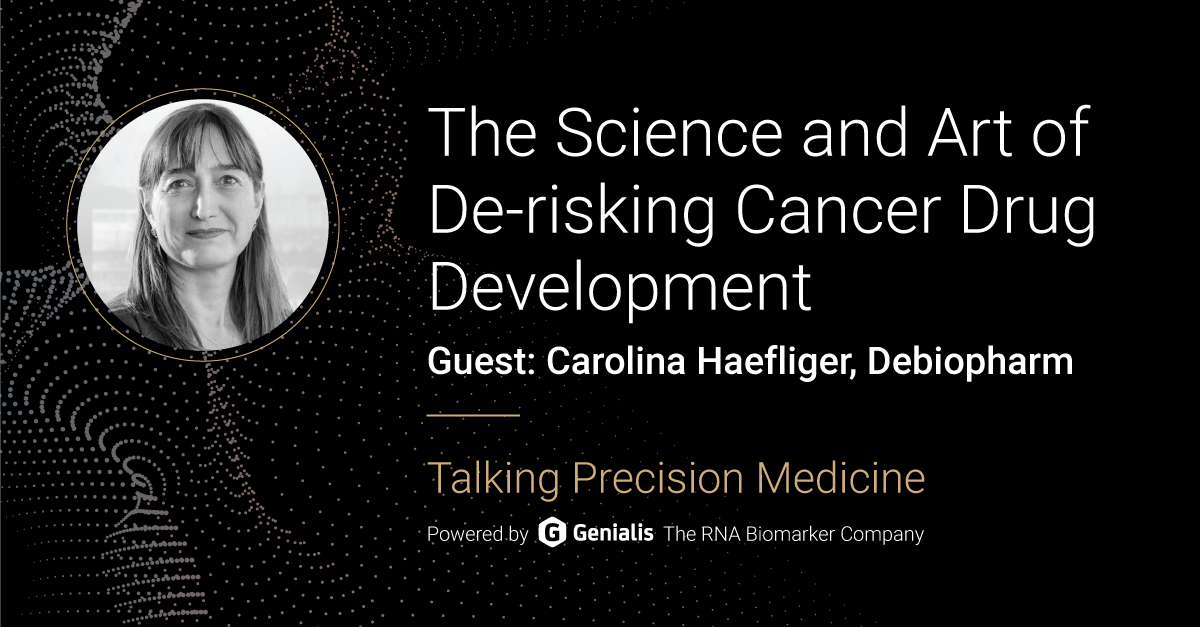Welcome to Talking Precision Medicine (TPM podcast) — the podcast in which we discuss the future of healthcare and health technology, and how advances in data and data science are fueling the next industrial revolution.
In this episode Rafael sat down with Dr. Carolina Haefliger, head of translational medicine at Debiopharm, the privately held Swiss biopharma company focused on oncology drug development. They talked about de-risking promising new cancer drugs, and what it takes from the science to the team to the technologies.
Come on in and have a listen.
Links:
- Debiopharm’s website
- Carolina Haefliger on LinkedIn
- Genialis and Debiopharm Set Up Biomarker Discovery Collaboration
Episode highlights:
Strategic Approach to Oncology and Drug Development
- Carolina Haefliger (MD) is Head of Translational Medicine at Debiopharm. With a background in clinical genetics, she has 20+ years of experience working mostly in large pharma.
“I’ve always been interested in precision medicine. I’ve always been interested in genetics, maybe because I’m a clinical geneticist. And I’ve always been curious about how to bring an insight, a biological insight, to something that is actionable. That’s probably why I ended up in pharma.”
- Debiopharm is a biopharmaceutical company that focuses on innovating drugs for high unmet medical needs in the fields of oncology and infectious diseases.
- Debiopharm focuses on “de-risking” molecules that have significant risks associated with them. Carolina Haefliger describes this process as essential to the company’s strategy: “We do all of the translational work and the early phase studies, and this is, I think, the core of our expertise.”
- Their journey involves establishing innovative partnerships, emphasizing their unique business model of in-licensing and developing products to proof of concept before out-licensing.
Innovative Partnerships and Focus Areas
- Carolina Haefliger highlights Debiopharm’s strategic partnerships with academia, biotech, and pharma companies for in-licensing products in the non-clinical stage, underscoring the importance of selecting the right molecules and partners.
- “The first decision that we need to take is what to in-license,” Carolina Haefliger explains, emphasizing the complexity and strategic nature of selecting molecules that align with Debiopharm’s capabilities and strategic goals.
- The discussion points to specific mechanisms of interest for Debiopharm, including DNA Damage Response (DDR) and Antibody-Drug Conjugates (ADCs), where the company utilizes proprietary technologies to develop differentiated products.
- Discussing the next generation of ADCs, Carolina Haefliger is excited about the advancements in various components of ADCs, including linker technologies, which are contributing to more effective cancer therapies.
Precision Medicine and the Role of AI
- Reflecting on the slow adoption of genomic-informed therapies in cancer treatment, Carolina Haefliger comments on the initial overestimation of the simplicity of translating the human genome into actionable treatments.
“At that time, I was amazed and thought we were going to solve everything. But looking at it back, it’s much more complex than what we thought it was. I’m positive. I think we’ve made huge progress. But I think there’s so much more to do. We’re just scratching the surface and the more we know, the more we know how much we don’t know.”
Data, AI, and the Digital Transformation
- The conversation touches on the potential of AI and machine learning to provide deeper insights into biology and disease mechanisms, which could revolutionize the way diseases are understood and treated.
“We have been looking at data in one way or another in a simple way, not being able to meta-analyze it, not being able to combine internal and external data. And this is where we will hopefully become smarter or get additional biological insights that help us to develop better, help us to find better biomarkers, identify the patient populations and also help us in understanding the pathophysiology of disease. So that we’re not treating an indication but rather an actual subset of patients that are driven by that specific pathophysiology.”
- Emphasizing Debiopharm’s digital transformation, Carolina Haefliger discusses the aim to increase efficiency and speed in trials and internal processes through the use of AI, optimizing the way data is captured, standardized, and analyzed for insights.
Navigating the Future of Cancer Treatment
- Carolina Haefliger envisions a future where early detection and equitable access to novel oncology drugs transform cancer into a manageable condition, emphasizing the need for treatments that are available across geographies and consider the entire population.
- The aspiration is to develop drugs with a curative intent that also balance safety and efficacy, ensuring patients not only live longer but have a better quality of life during treatment.
This has been Talking Precision Medicine. Please subscribe and share our podcast with your colleagues, leave a comment or review, and stay tuned for the next episode. Until then you can explore our TPM podcast archive and listen to interesting guests from our past conversations.


